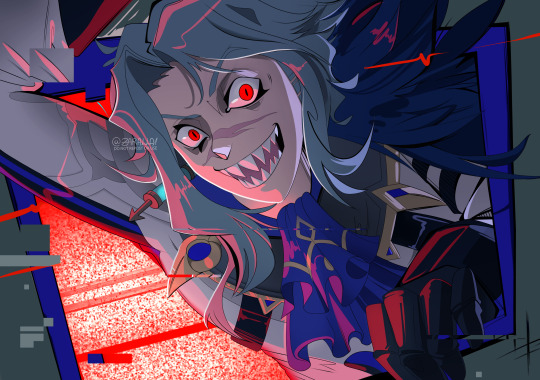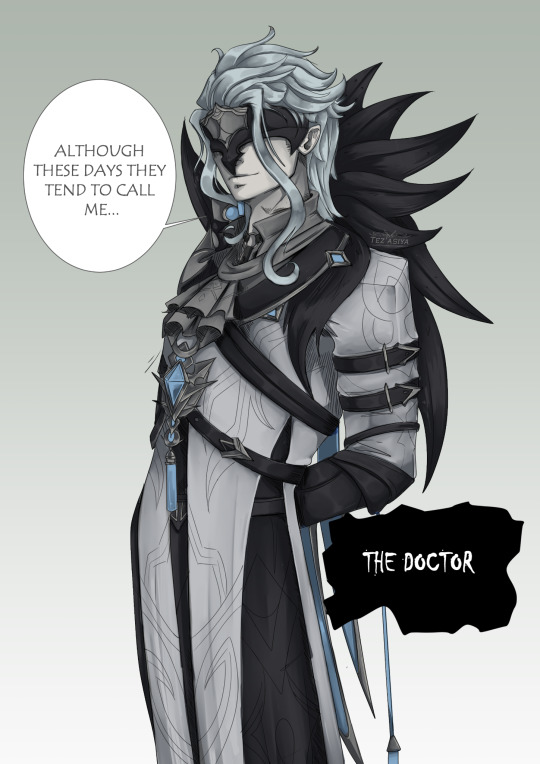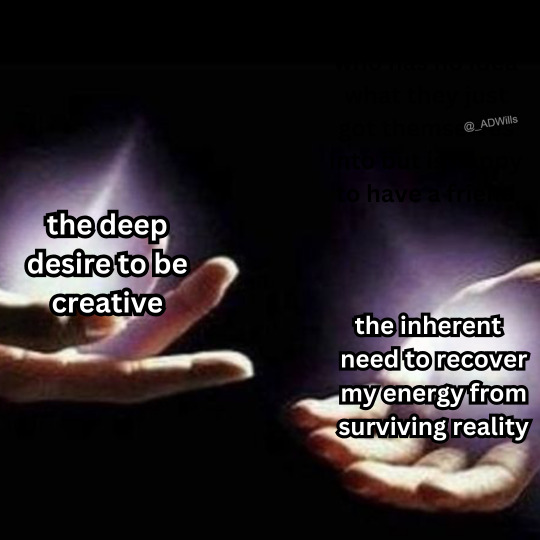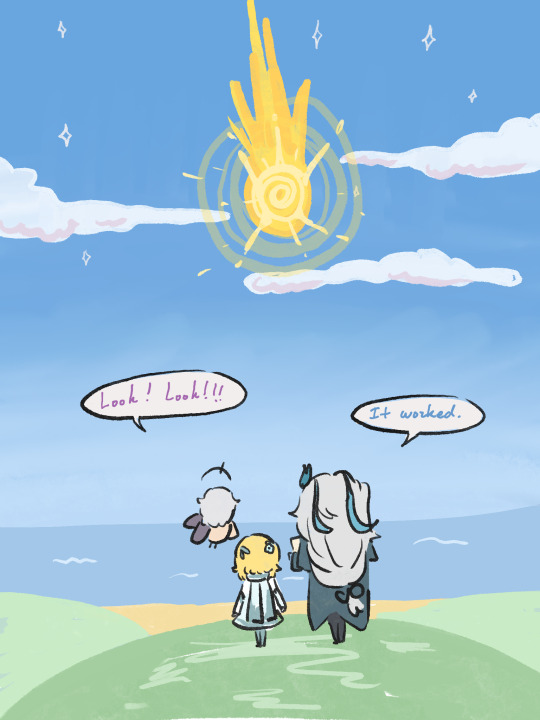Text
can someone please be proud of me like fuck I’m trying
2M notes
·
View notes
Text
Somehow, writing an essay is easier than writing a piece of fiction despite the fact that I'm arguably writing the same amount of words.
#haeresysspeaks#I am steadily losing my sanity with the segment OC oneshot I'm writing#I'm going to finish it though. I refuse to give up on it when I'm already 3000 words in#In the meantime if I write any more long posts about Dottore. Just assume the fanfic writing is going poorly
0 notes
Text
The urge to make a post compiling the tags I've had on my Dottore meta posts... there have been perfect additions to them and they need to be Acknowledged.
#haeresysspeaks#I no longer know if it's acceptable to do that on Tumblr. I hope it is because boundinparchment's thoughts are always on point#I must HIGHLIGHT THEM.
1 note
·
View note
Text

ERr0R 00 Virus infestation
Who should I contact if my wallpaper comes alive? 🤔🤔🤔 I seem to be having a case of Dottore trying to punch through ^^
89 notes
·
View notes
Text

Man knows how to make an entrance 👀 (yes I realise many of the harbingers are in my pile of favourites shhh 😅) Sumeru plot is giving so far, the characters are so fun! 💚
175 notes
·
View notes
Text

#other media#Yeah. Y e a h.#Staring at the segment fic I haven't even begun to finish yet#Or the Dottolone fic that's still barely even half written
217K notes
·
View notes
Text
Seeing @sodalitea's Sabzerus Festival Dottore reminded me of an entirely self-indulgent headcanon I came up with some time ago, but never actually got the chance to share.
Imagine, if you will, that post-Irminsul purification, dancing thrives throughout Sumeru's history. It is such a huge part of their culture, in fact, that dancing even makes its way into the Akademiya as a method of meditation. After all, dancing is used to honour Kusanali and celebrate her Wisdom.
In dancing, Sumerians allow their bodies to separate from their conscious mind by losing themselves in the flow of the music and the familiarity of the steps. With their bodies conducted in this manner, they no longer need to worry about the basic, underlying functions that take up quite so much of their mental faculties. Instead, they are able to let their minds wander; to contemplate their theses without distraction, to unlock the true depth of their Knowledge and access the whole element of Dendro for its Wisdom.
In their belief, they are as close to Kusanali in these moments as when she actively walks among them - closer, even, as it is almost like accessing fragments of that imaginary state in their dreams that contains their most powerful and influential discoveries. It is her divine energy that allows them to separate mind from body without dissociating from themselves entirely, without drawing themselves abruptly back until their solutions have been found.
So, naturally, most Sumerians do this when they've hit a roadblock in their research and are in desperate need of a fresh perspective or new inspiration.
When studying inside the Akademiya, it isn't unusual to see a fellow student abruptly stand up, access a side-room dedicated entirely to this practice, and dance for minutes on end before jolting, abruptly, from their trance, only to come rushing back in again with trembling fingers eagerly grasping for parchment and quill.
It's considered so vital, in fact, that the Akademiya has official classes to teach the method to foreign students. Sumerian students will even take it upon themselves to teach their classmates should they clearly be struggling to grasp the dances. It becomes as ingrained within them as it is within the native Sumerians themselves, and even once they've completed their studies and returned to their home nations, it's not uncommon to see them continuing the practice with startling regularity.
Which does lead me to the culmination of this piece (because this was never not going to be about him):
Dottore, alone in his laboratory, slowly dancing to a melody he hums to himself, trying desperately to return to the trance he once knew as a student, seeking that hit of inspiration for a breakthrough he's been on the verge of for months and months. But Dendro does not reach him in his godless abode, and he does not find himself slipping away from his body into the warm embrace of Kusanali's limitless Knowledge. Still, he dances. He dances for the God he forsook; dances in her honour when he has none. Sumerian blood runs through his veins, regardless of how frequently he flushes them out.
25 notes
·
View notes
Text
Sabzeruz Festival Celebration

My bellydancer Zandik (aka Akademiya Zandik Segment in his Nilou phase) is ready to shine! I'm glad that I managed to finish this piece on Nahida's birthday (Sabzeruz Festival in Genshin Impact). After all Dottore is linked to the abnormal phenomenons around this festival and his Sumerian identity is a big part of his psyche (@haeresysabound wrote short analysis on this topic and it heavily resonated with my own thoughts). How about him paying honors to his family nation's Archon in more pacifistic way? After all, knowledge is the greatest value for him and his respect for the God of Wisdom is natural. Even if the said Archon, the last person in this nation that (in his hopes) could possibly try to understand him and give him the sense of belonging to his homeland as he finally faced her after centuries (have in mind that during his Akademiya years Nahida was still in captive and Sages were questioning her authority and even existence), disapproved of his methods and he faced rejection once more.
Don't repost my artworks, please! I'll appreciate likes, comments and reblogs. ♡
#il dottore#dottore#fanart#genshin impact#This is such a beautiful piece of artwork and I genuinely can't get enough of it#His dynamic pose and the gorgeous choice of colours... how serene he looks mid-dance#Not the mention the detailing on his outfit! It looks traditionally Sumerian but still very Dottore#This segment is beautiful and stunning and I am SO happy to see another 'dance in honor of Kusanali' headcanon
74 notes
·
View notes
Note
Your Dottore meta is SO quality
Thank you so much! I'm glad you've enjoyed the meta thus far. :3c I have a lot of thoughts about Dottore and I have been spurred on by recent Twitter discourse to give him the character analysis he actually deserves. He's such a fascinating and complex villain and an interesting character to dive into.
#haeresysspeaks#Tumblr is the home of love villain but I'm still beyond glad to see how well the meta's being received#I just love him! I love him so much. Dottore enraptured me with his dramatic entrance at the Akademiya and his genius medical malpractice
2 notes
·
View notes
Text
I just wrote that whole damn post and after finishing it I'm squinting at it desperately trying to decide if it makes sense.
I think it does.
Like, 90% sure it does.
Man I am so goddamn tired.
0 notes
Text
A certain cutscene has been circling about on Twitter again, specifically in regards to the fairytale Nahida tells detailing Scaramouche's past as Kabukimono and the events that led to him joining the Fatui, which (perhaps unsurprisingly) got me thinking.
The way Nahida portrays Dottore is simply fascinating.
First of all, she notes that when he takes off his fox furs to stare at his own reflection, he "laments" that he is a monster and the foxes around him are incapable of seeing it. A interesting choice of word, that. "Laments." Not gloats, or crows, or cackles with sadistic glee. He laments - expresses grief and sorrow - that they are incapable of seeing him for what he truly is. She continues with his dialogue in saying that he pities them, yes, so he doesn't exactly hold remorse for his deception, but she clearly portrays him as having a sort of sadness that he cannot be accepted for who he is.
This fits in perfectly well with what we know of Dottore from his interactions within the Archon Questline itself. He does hold bitterness over the Akademiya's inability to accept his genius. He holds a sense of betrayal over being chased out of his hometown with pitchforks for being nothing more than a perfect example of Sumerian intellect. He understands that other people see him as a monster, but Dottore genuinely does not see himself that way and it bothers him.
He tells us in his Archon Quest that he has no intention of being rejected by his homeland for a third time. Dottore does not hate his nation. Not entirely. Some part of him would very much like to be acknowledged by it. He does not strive for rejection; he genuinely seeks acceptance.
Which leads to the next interesting part of Nahida's fairytale: she claims that he finds "solace" in the arrival of Kabukimono; someone he considers to be an outsider like him. Dottore has already accepted that people do not consider him to be a human and that they will only ever see him as a monster, yet he isn't entirely happy about it. He still seeks kinship. He finds comfort in knowing that someone else is as much of a freak as he is - someone who looks human believably enough, but clearly isn't.
I'm in no way entirely saying that Dottore had any desire to befriend Kabukimono, nor that he only ever had positive intentions for him. What I am saying, however, is that Dottore clearly did feel better when he wasn't the only 'monster' among the humans. Someone who was equally as unlikely to be accepted; someone who could, perhaps, understand his world view. Kabukimono was an outcast of humanity as well. Wouldn't that be wonderful, to be outcasts together? To know that he wasn't entirely alone even in his monstrosity?
To find comfort in knowing that he wasn't the only person to exist utterly incapable of being accepted for who he is?
Except, as the fairytale goes on, Kabukimono is accepted. He isn't a fox - he is evidently different; Nahida points out his slim tail compared to the foxes' bushy tails and obviously presents him as a kitten in a clear comparison to humanity that Dottore isn't afforded - yet the foxes overlook those flaws. They overlook the things that make him different and accept him for what he is.
There's a difference here, of course. Dottore is still pretending to be a fox; Kabukimono never pretended to be anything else. It was always going to be easier for the humans in the actual timeline to accept Kabukimono because he wasn't hiding. But clearly, that didn't matter.
Again, I'm not saying that Dottore did everything that followed because of this event. He was at the furnace for a reason and it was highly unlikely to conclude in any other way. But there is something exceptionally personal about the way he ends up enacting the actual plan that definitely would not have happened had Kabukimono not been there.
Because Nahida's fairytale continues by explaining that Dottore is "furious at the happy resolution".
This is the part I find most fascinating. Dottore is furious that Kabukimono finds acceptance. Something that isn't even human is accepted when he, who has always been human, is incapable of being understood and seen and accepted the way he wants to be. But it's more than that. It's the realisation that he is being forced back into solitude. He doesn't have that kinship anymore. There is no longer someone who could possibly understand his worldview. All of the comfort Dottore previously found in Kabukimono's existence is torn away from him so quickly.
At this point, Dottore knows he won't be accepted by humanity. He's already been branded a monster. If he took off the disguise, he wouldn't be welcomed as Kabukimono was; he would be chased away yet again. So copying Kabukimono's approach isn't possible.
What is possible, however, is ensuring that Kabukimono will never accept or be accepted by humanity ever again... which makes it much easier to later recruit him into the Fatui - not as a singular experiment for Dottore's own purpose, but as a comrade. A very purposeful word choice Dottore himself uses when musing aloud to Pierro about his success at the furnace.
The way Nahida portrays Dottore in the fairytale suggests that there's a lot more to him and the things he does than the inherently logical and sadistic mad-doctor curiosity that he more openly expresses. We've already seen it before, in small form, and I've talked about that before as well, but the fairytale takes it to a level beyond what we know from the Archon Quests.
Dottore is human. He seeks acceptance, doesn't understand why he won't be accepted, and is evidently bothered by it. He enjoys not being the only 'monster' in the world. He dislikes it when that kinship is taken away from him, so he takes it back - almost in a reflection of his own acceptance into the Fatui.
And I just think it's neat to see the layers in his character presented this way from the Archon of Knowledge herself.
(Also, not entirely related to the fairytale itself, but I noticed this as I was watching both the fairytale cutscene and the Niwa-Escher cutscene for dialogue, so I wanted to include it as well:
Clearly, Dottore does have an interest in Kabukimono as an experiment. That's essentially his whole point. His conversation with Niwa shows as much; the moment he actually met Kabukimono, he was already planning a way to use the furnace as a step towards obtaining Kabukimono for the purposes of his experiment. But there is something interesting that he mentions - two things, actually - that show the truth within the fairytale portrayal of Dottore.
One is that he thinks it is inevitable for Kabukimono to lose his innocence as humans will always use - and fail to accept - one that is not 'our own kind'.
Two is that he ponders whether gaining Niwa's heart will turn Kabukimono human... before declaring that it's "quite impossible".
Even in reality, Dottore sees himself as human. He accepts that other people see him as a monster - even encourages Niwa to do so out of respect for the man to lighten the blow of falling into Dottore's carefully laid trap - but he does not see himself as anything other than human. At the same time, he doesn't believe that non-human beings are capable of becoming human. Just as the fairytale implies, Dottore doesn't believe that he will ever be accepted by people who don't already see him as human.
I just think it's interesting to think about.)
162 notes
·
View notes
Text


Good luck to all the Wriothesley pullers tomorrow!
Channeling all the luck for you!
#genshin impact#neuvillette#wriothesley#lumine#paimon#fanart#This post blessed my pulls. I got him on the first 10 pull#At 9 Pity I think? It was directly after getting Neuvillette
7K notes
·
View notes
Text

POV: Dottore commits medical malpractice on you 💉💉
220 notes
·
View notes
Text
I do have thoughts on the whole "Harbingers represent the Ideals of their home nations" thing in regards to Arlecchino as well, but I am A) waiting to see how the rest of the Archon Quests go first and B) a little bit too low energy at the moment to make ramble posts without the dopamine hit of Talking About Dottore.
#haeresysspeaks#I am just a silly little man with a fascination with This One Man Specifically#Once my medication settles down however. Then it's over for the dashboard
3 notes
·
View notes
Text
Something I've sort of noticed about the Harbingers is that (thus far) each one is a perfect representative of their home nation's Ideal, and that it's a fundamental betrayal of that Ideal - in their eyes, at least - that causes them to become Harbingers.
My favourite example of this is (unsurprisingly) Dottore. When you look at Dottore from a purely objective standpoint, he is the living, breathing Ideal of Wisdom. Everything he does is in pursuit of Wisdom; every experiment, every grandiose show, every failure - because there is something to be gained from failure, isn't there? Scaramouche's ascension to godhood was a failure, after all, but Dottore still recognises that it isn't a complete loss. He still learnt something in the process. He still attained something he didn't know before. That's why people tend to note that it's the experiment Dottore is more interested in than the actual result; an unexpected outcome is just another avenue to explore, more information gained.
He seeks knowledge on that which shouldn't be known because it is the purest form of knowledge. Forbidden knowledge is still knowledge, after all, and knowing it is a form of power and Wisdom that very few can lay claim to. Why limit oneself to knowing that which is easily attained? Why not press onward to the absolute destruction of ignorance? Why not learn the very secrets of the world? Isn't that what Wisdom is?
That doesn't mean that he's right, of course - Wisdom is also the ability to recognise why you shouldn't stare into the Abyss and the consequences that will occur if the Abyss just so happens to stare back - but it does mean that he is the purest form of the Ideal Sumeru holds at the core of its existence.
And I simply find that fascinating. Dottore as he sees himself - and, frankly, as he is - is the best scholar to ever walk Sumeru's forests. If knowledge is what they ultimately seek, the limiting and outright banning of certain topics of research would naturally seem to go against the overall Ideal of Wisdom. It would be very difficult to understand why he was turned on by the people who should have lauded his achievements when all he did was strive for ultimate perfection of the Ideal he was raised to hold dear.
So naturally, he would view that as a betrayal of the very Ideal itself.
Nevermind the fact that he is, technically, very wrong - Nahida is the one who defines Wisdom, after all, and her definition is very different to Dottore's - but the point remains. It's his conviction of the Ideal that makes the betrayal sting, and that makes him a prime target for the Fatui.
If they're trying to overturn the old ways, after all, it makes sense to use people who are as representative of and driven by the Ideals as the archons themselves.
193 notes
·
View notes

